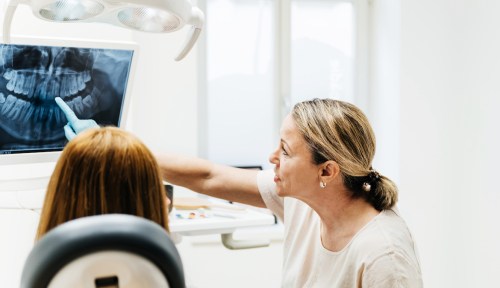One Surprising Place Where Your Poor Sleep Habits Could Turn Up? The Dentist’s Office
Learn why one place your sleep habits could turn up is in the dentist’s chair, thanks to the connection between sleep and oral health.

If the eyes are the window to the soul, just look a little further down the face to find the doorway to your health.
Experts in This Article
president-elect for the American Academy of Dental Sleep Medicine
“The mouth is the gateway to your body,” says Kevin Postol, DDS, the president-elect for the American Academy of Dental Sleep Medicine. “Oral health is a lot of times a precursor of other things that are going on in your body. A healthy mouth will lead to a lot of other things about having a healthy body.”
Another major factor in your overall health? Your sleeping habits. Getting a good night’s sleep regulates your mood, reduces stress, and restores your muscles, while sleep deficiency has been linked to a weakened immune system and serious conditions like heart disease. So for something that’s so intricately connected to our overall health, it makes sense that sleep would show up in that “gateway” to our bodies—our mouths—too.
In fact, sleep and oral health are directly connected. And your dentist has a front-row seat to how they could be impacting each other.
Dr. Postol looks for clues in a patient’s mouth that could indicate they’re having sleep problems. A smaller soft palette and arch of your teeth, as well as a tongue that has scalloped edges, might mean your anatomy predisposes you to an issue like sleep apnea. In that case, your tongue might not have room to rest at the top of your mouth like it’s supposed to (hence the scalloped edges from pressing against your teeth), which might cause it to fall backwards in your mouth, and disrupt your breathing at night.
Ground front bottom teeth could also mean you’re shifting your jaw to compensate for trouble breathing, while ground down molars (grinding is called bruxism), might mean stress and tension is impacting your zzzs.
“Some people don’t sleep all night because of the fact that they might have some type of inflammation in the body or stress in their life at that point,” Dr. Postol says. “People will start clenching their teeth, and then they wake up a lot because they’re grinding on their teeth.”
A dry mouth could also indicate that you’re mouth-breathing or snoring, a sign of disrupted sleep. Gum disease or cavities could indicate a weakened immune system, which can also be a signal that you’re not getting enough sleep.
“[These signs] can be a little wake-up call that maybe you need to address with the patient,” Dr. Postol says. “Are they sleeping well? Are they snoring? Are they having any health issues that we might be made aware of that might be linked to them possibly having a sleep issue?”
Dr. Postol sees dentists as potentially your first line of defense in identifying sleep problems. “More people in the United States see dentists on a regular basis than they do their primary care physicians,” Dr. Postol says. Paying our dentist a bi-annual visit is a great way to be proactive about your dental health, and your sleep health, too—as long as, ya know, you actually go to the dentist.
—medically reviewed by Angela Holliday-Bell, MD
Sign Up for Our Daily Newsletter
Get all the latest in wellness, trends, food, fitness, beauty, and more delivered right to your inbox.
Got it, you've been added to our email list.










